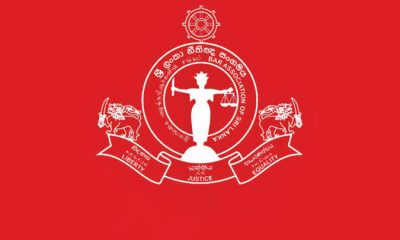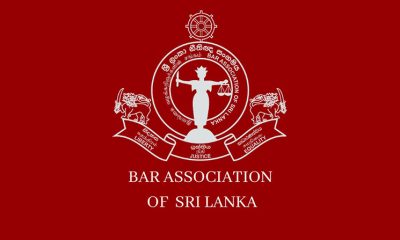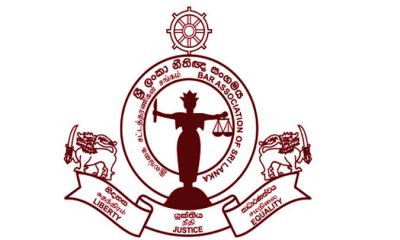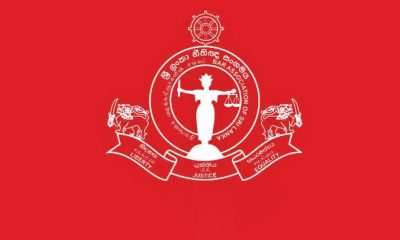News
Mahanamahewa flays ‘parliamentary system’ over contempt of SC issue
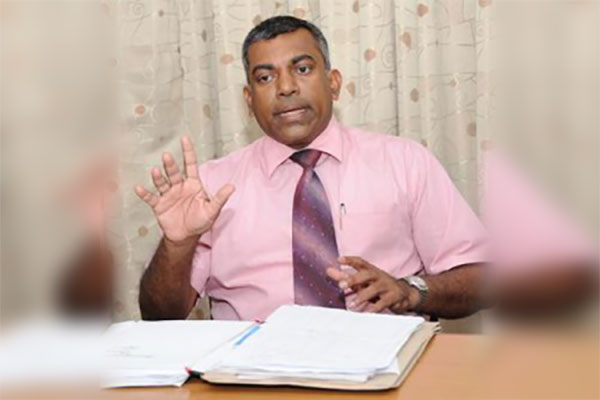
BASL says ‘it is a matter entirely for the House’
By Shamindra Ferdinando
Prof. Prathiba Mahanamahewa of the Colombo University Law Faculty, yesterday, lambasted the double standards in dealing with lawmakers over contempt of court, which, too, tended to erode public confidence in the parliamentary system.
The Attorney-at-Law said so referring to the sentencing of Gampaha District MP Ranjan Ramanayake (SJB) to four years imprisonment and Jaffna District (TNA) MP M.A. Sumanthiran being allowed to take refuge under parliamentary privileges for also flaying the Supreme Court recently.
Prof. Mahanamahewa said so on ‘The Challenge’ on Jayamaga TV, anchored by Anushi Hakmanage.
The academic asked why the two lawmakers were treated differently over the same offence. He said criticism of the Supreme Court was not acceptable on any grounds or tolerated, under any circumstances.
Warning that the public had realised the double standards in respect of the same offence committed by two different lawmakers, the Mahanamahewa stressed the responsibility on the part of Speaker Mahinda Yapa Abeywardena to address the issue at hand.
Speaker Abeywardena said the matter was before the party leaders when The Island raised the issue with him. The Speaker said that though he received a complaint from Justice Minister Dr. Wijeyadasa Rajapakse, PC, in that regard, the party leaders should address the issue at hand. Lawmaker M.A. Sumanthiran declined to comment.
In a hard hitting letter to Speaker Abeywardena, last week, Justice Minister Rajapakse asked for the appointment of a Special Parliamentary Select Committee to examine MP Sumanthiran’s conduct, in the wake of his strong criticism of the SC, during the debate on the 21st Amendment to the Constitution. Sumanthiran skipped the vote whereas six out of the 10-member TNA parliamentary group, voted for the new law.
However, Saliya Peiris, PC, President of the Bar Association said: “Speeches made by MPs in Parliament are covered by the parliamentary (Powers and Privileges) Act. That is a matter entirely for the Parliament.”
At the onset of the live interview, Prof.Mahananahewa asserted that there were far more important issues to be addressed, than exposing dual citizens in Parliament.
The Attorney-at-Law questioned whether the Parliament. as a result of conduct of its members, caused doubts among the public regarding responsibility and accountability.
The Prof. dealt with the gradual expansion of the parliamentary structure, since independence, with the introduction of the PR (proportional representation) system, in 1989, at the expense of the first-past-the-post system. Acknowledging the current election process was meant to ensure a much wider public representation, Prof. Mahanamahewa asked whether Parliament met the expectations of the electorate.
Referring to the composition of Parliament – 196 elected and 29 appointed members – lawyer Mahanamahewa said that MPs led quite comfortable lives, though the vast majority of the people were struggling to make ends meet. The lawyer briefly discussed the massive eruption of public protests, in March, over the disruption of essential supplies as a result of years of waste, corruption, mismanagement and irregularities blamed on successive governments.
Responding to another query from the interviewer, Prof Mahanamahewa said that in spite of Litro being almost 100 percent owned by the government, those who suffered damages, as a result of gas explosions, weren’t paid compensation.
However, in the case of lawmakers, whatever the reasons, their grievances are addressed promptly, Prof Mahanamahewa said.
Contrary to the much-touted assurances, regarding equality among the population, lawyer Mahanamahewa questioned how restrictions were imposed on the fuel distribution by way of operation of ‘QR’ code. Pointing out that these restrictions applied only to some sections of the population, lawyer Mahanamahewa complained bitterly about lawmakers, some of whom were not even qualified to be tea makers, but were afforded privileged status.
The law professor asked whether Parliament fulfilled its primary obligations, namely financial discipline and enactment of laws. Asserting that Parliament had failed to meet basic aspirations of the public, lawyer Mahanamahewa queried who caused the deterioration of Parliament to such an extent the public now questioned the parliamentary system of governance.
News
US sports envoys to Lanka to champion youth development

The U.S. Embassy in Colombo welcomed the U.S. Sports Envoys to Sri Lanka, former National Basketball Association (NBA) and Women’s National Basketball Association (WNBA) players Stephen Howard and Astou Ndiaye, from June 8 through 14.
The Public Diplomacy section of the U.S. Embassy said that it would launch a weeklong basketball program intended to harness the unifying power of sports, made possible through collaboration with Foundation of Goodness and IImpact Hoop Lab.
While in Sri Lanka, Howard and Ndiaye, both retired professional basketball players, will conduct a weeklong program, Hoops for Hope: Bridging Borders through Basketball. The Sports Envoys will lead basketball clinics and exhibition matches and engage in leadership sessions in Colombo and Southern Province for youth aged 14-18 from Northern, Uva, Eastern and Western Provinces, offering skills and leadership training both on and off the court. The U.S. Envoys will also share their expertise with the Sri Lanka Basketball Federation, national coaches, and players, furthering the development of basketball in the country. Beyond the clinics, they will collaborate with Sri Lankan schoolchildren to take part in a community service project in the Colombo area.
“We are so proud to welcome Stephen and Astou as our Sports Envoys to Sri Lanka, to build on the strong people-to-people connections between the United States and Sri Lanka,” said U.S. Ambassador Julie Chung. “The lessons that will be shared by our Sports Envoys – communication, teamwork, resilience, inclusion, and conflict resolution – are essential for leadership development, community building, equality, and peace. The U.S. Sports Envoy program is a testament to our belief that sports can be a powerful tool in promoting peace and unity.”
News
Rahuman questions sudden cancellation of leave of CEB employees

SJB Colombo District MP Mujibur Rahuman in parliament demanded to know from the government the reasons for CEB suspending the leave of all its employees until further notice from Thursday.
MP Rahuman said that the CEB has got an acting General Manager anew and the latter yesterday morning issued a circular suspending leave of all CEB employees with immediate effect until further notice.
“We demand that Minister Kanchana Wijesekera should explain this to the House. This circular was issued while this debate on the new Electricity Amendment Bill was pending. There are many who oppose this Bill. The Minister must tell parliament the reason for the urge to cancel the leave of CEB employees,” the MP said.However, Speaker Mahinda Yapa Abeywardena prevented Minister Wijesekera responding to the query and said that the matter raised by MP Rahuman was not relevant.
News
CIPM successfully concludes 8th Annual Symposium

The Chartered Institute of Personnel Management (CIPM) successfully concluded the 8th Annual CIPM Symposium, which took place on 31st May 2024. Themed “Nurturing the Human Element—Redefining HRM in a Rapidly Changing World,” the symposium underscored the pivotal role of human resource management (HRM) in today’s dynamic global landscape. Since its inception in 1959, CIPM has been dedicated to advancing the HR profession through education, professional development, and advocacy, solidifying its position as Sri Lanka’s leading professional body for HRM.
Ken Vijayakumar, the President of the CIPM, graced the occasion as the chief guest. The symposium commenced with the welcome address by the Chairperson, Prof. Arosha Adikaram, followed by the Web Launch of the Symposium Proceedings and Abstract Book by the CIPM President. The event featured distinguished addresses, including a speech by Chief Guest Ken Vijayakumar, President of CIPM, and an address by Guest of Honor Shakthi Ranatunga, Chief Operating Officer of MAS Holdings Pvt. Ltd., Sri Lanka.
The symposium also featured an inspiring keynote address by Prof. Mario Fernando, Professor of Management and Director of the Centre for Cross Cultural Management (CCCM) at the University of Wollongong, Australia.
Vote of Thanks of the inauguration session was delivered by Dr. Dillanjani Weeratunga, Symposium Co-chair.
The symposium served as a comprehensive platform for researchers to present their findings across a wide range of critical topics in HRM. These included Cultural Diversity and Inclusion, Talent Development and Retention, Ethical Leadership and Corporate Social Responsibility, Adapting to Technological Advancements, Mental Health and Well-being at Work, Global Workforce Challenges, Employee Empowerment, and Reskilling and Upskilling.
The plenary session was led by Prof. Wasantha Rajapakse. Certificates were awarded to the best paper presenters during the valedictory session, followed by a vote of thanks delivered by Kamani Perera, Manager of Research and Development.
The annual symposium of CIPM was a truly inclusive event, attracting a diverse audience that spanned undergraduates, graduates, working professionals, research scholars and lecturers. This widespread interest highlights the symposium’s significance in the field of HRM, offering a unique opportunity for everyone to network and learn from scholarly brains.The CIPM International Research Symposium was sponsored by Hambantota International Port, Sri Lanka Institute of Information Technology (SLIIT), E B Creasy & Co. PLC, and Print Xcel Company.


